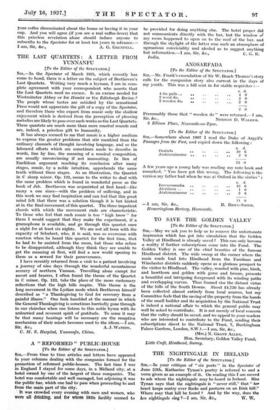THE LAST QUARTETS : A LETTER FROM YUNNANFU
[To the Editor of the SPECTATOR.] the Spectator of March 19th, which recently has come to hand, there is a letter on the subject of Beethoven's Last Quartets. Writing very much a layman, I am in com- plete agreement with your correspondent who asserts that the Last Quartets need no excuse. Is an excuse needed for Westminster Abbey or for Hamlet or the Edinburgh Review ? The people whose tastes are satisfied by the sensational Press would not appreciate the gift of a copy of the Spectator, and therefore those who expect from music only the shallow enjoyment which is derived from the perception of pleasing melodies are likely to pass over such works as the Last Quartets. These quartets are much more than mere musical rounds and are, indeed, a priceless gift to humanity.
It has always seemed to me that music is a higher medium to express the greater problems that stir mankind than the ordinary channels of thought involving language, and so the laboured efforts which are sometimes made to describe in words, line by line, the meaning of a musical composition, are usually unconvincing if not nauseating. In lieu of Euclidean argument reaching its conclusion after many stages, music, by a noble intuition, apprehends the same truth without these stages. As an illustration, the Quartet in C sharp minor, Op. 131, seems to the writer to deal with the same problem which is found in wonderful prose as the book of Job. Beethoven was acquainted at first hand—like many a one since—with the problem of suffering, and in this work we may find inspiration and can feel that this great mind felt that there was a solution though it is but hinted at in- the final movement of this quartet. The three impatient chords with which the movement ends are characteristic. To those who feel that such music is too " high brow " for them I would suggest that they make the experiment, if a gramophone is available, and go through this quartet once a night for at least six nights. We are not all born with the capacity of Schubert, who, it is said, was so overcome with emotion when he heard this quartet for the first time, that he had to be' assisted from the room, but those who refuse to be disappointed, although they think they are unable to get the meaning at first, will find a new world opening to them as a reward for their perseverance.
I have recently returned from a visit to a patient involving a journey of nine days through the wonderful mountainous scenery of northern Yunnan. Travelling alone except for escort and bearers, I often found the theme of the Quartet in C minor, Op. 132, take the place of the more customary reflections that the high hills inspire. This theme is the long movement in the Lydian mode which Beethoven himself described as " a Thanksgiving to God for recovery from a painful illness." One feels humbled at the manner in which the General Thanksgiving is sometimes hurriedly gone through in our &Arches when one listens to this noble hymn with its unhurried and reverent spirit of gratitude. To some it may be that many hearings will be necessary ere the receptive mechanism of their minds becomes used to the idiom.—I am,
C. M. S. Hospital, Yunnanfu, China.










































 Previous page
Previous page